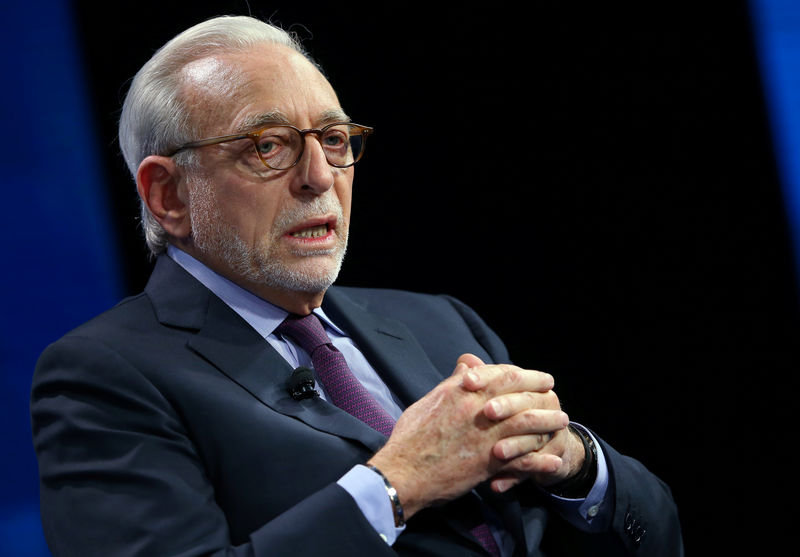By Svea Herbst-Bayliss
(Reuters) - Frustrated by high fees and uninspiring returns, pension funds, sovereign wealth funds and other big institutional investors are demanding U.S. activist hedge funds be more transparent about their investment ideas and charge less, investors and fund managers say.
Activist hedge funds push for changes at companies, ranging from ousting management and board directors to buying back stock and divesting non-core assets. Traditionally they have used capital from their total pool of investor money to build stakes in companies, without telling clients in advance what their targets and strategy will be.
They then go "active" and call for changes in some of the companies they invest in, but charge the same fees for all the money that investors place with them.
Now, institutional investors are increasingly pressuring the hedge fund managers to raise separate pots of capital for each company they target through so-called special purpose vehicles, and have been able to drive down how much they pay for investment gains.
Fund managers now have to bring their best ideas, fully formed and described in detail in glossy pitch books, outlining to their investors exactly how they plan to drive up a company's stock.
"This structure lets us look at dozens of transactions and only invest in a manager's very best ideas," said Gregg Hymowitz, chief executive officer of EnTrust Global, one of the largest investors in special purpose vehicles raised by activist hedge funds. "For lower fees and with an increased level of transparency, we can specifically target only the highest-conviction ideas of our partners."
There is no industrywide data on the proliferation of these pools of capital, often referred to as co-investments or sidecars, because fundraising is confidential, but investors and fund managers said their use is growing.
Some of the industry's most prominent activists, including Nelson Peltz's Trian Fund Management LP, Keith Meister's Corvex Management LP and Glenn Welling's Engaged Capital LLC, are increasingly relying on special purpose vehicles to raise money. Smaller players like J. Daniel Plants' Voce Capital Management are also turning more to co-investments for their campaigns.
The fund managers either declined to comment or did not respond to a request for comment.
Electronics maker Sony Corp (T:6758), retailer Bed Bath & Beyond Inc (O:BBBY), building materials producer Eagle Materials Inc (N:EXP), insurance company Argo Group International Holdings (N:ARGO) and specialty chemicals provider Ashland Global Holdings Inc (N:ASH) are among the companies that were targets of campaigns mounted by activist hedge funds through co-investments, investors said.
The companies either declined to comment or did not respond to requests for comment.
The proliferation of special purpose vehicles underscores how activist hedge funds, run by some of the biggest personalities in the industry, have lost some of their star power, as returns and assets under management have sagged amid increasing competition and misplaced bets on overvalued companies.
"Previously fund managers were almost always in the driver's seat. That has changed for many now," said Eleazer Klein, a partner at law firm Schulte Roth & Zabel, who advises activist investors.
Last year activists lost 10.4% on average, far more than the hedge fund industry's average 5% drop, according to data from research firm Hedge Fund Research. Assets under management shrunk by 16% from their peak in 2015 to $146 billion at the end of last year. Activist hedge funds are performing better this year, returning 10.1% in the first six months of 2019, according to HFR data.As demand for activist funds dried up at a time investors wanted less exposure to stocks, they suddenly had significantly more power to dictate terms in return for their multi-million-dollar investments. Managers who needed the cash were ready to compromise on fees.
Hedge funds have traditionally charged a 2% management fee and 20% of the gains. Co-investments often charge no management fees and require investors to pay only 10% of the profits. In addition, fees, instead of being collected annually, are collected only at the end of the investment period, which tends to be longer, between three and five years, managers and investors said.
CURBING ABILITY TO MOVE AT WILL
Some fund managers complain that the shift in the fundraising model is cumbersome and limits their ability to target companies when they are ready and to do so in secret.
It can also raise the risk of a leak that can drive up a target's stock price and give the target an opportunity to line up defenses.
Sony, for example, was able to hire investment bankers and prepare its strategy weeks before Daniel Loeb's Third Point approached it with its demands, after Reuters reported in April that the hedge fund was raising a special purpose vehicle to target the Japanese company, according to people familiar with the matter.
But special purpose vehicles have advantages, too, giving activists access to more cash than they normally would be able to deploy, allowing them to go after bigger companies.
In the case of Sony, Third Point built a $1.5 billion stake with the help of co-investment, a big bet that would have run afoul of rules of how much money Loeb could allocate to a particular bet in his main $15 billion fund, according to investors.
Third Point did not respond to a request for comment. Sony declined to comment.

"Fund managers find it an efficient way to raise capital, it is a win-win," said Corvex's Meister, who has raised several billion dollars for co-investments over the last years.